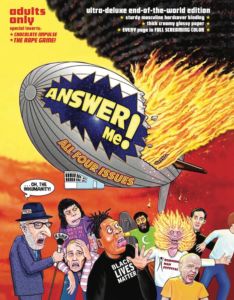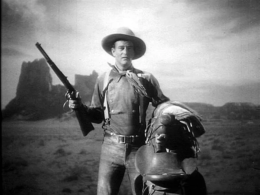Race and Ethics in John Ford’s Stagecoach
Posted By Jim Goad On In North American New Right | Comments DisabledAlthough I was born at a time when Westerns were a central fixture of American pop culture, I never paid them much attention until much later in life when I chanced upon a repeat playing of director John Ford’s epic 1939 film Stagecoach on late-night TV.
I’d grown up as a member of a generation that told me that actor John Wayne epitomized everything that was wrong and uncool about American culture. But viewing Stagecoach for the first time, I was taken aback to see that John Wayne burned a hole in the screen with his heroic presence from the moment he appeared somewhere out in the devastatingly gorgeous desert landscape of Monument Valley as The Ringo Kid. Wayne’s character was an escaped convict who hitched a ride on a stagecoach with the driver, a lawman, and six passengers as they made their way from the apparently fictional town of Tonto, Arizona to the real town of Lordsburg, New Mexico. Looming over everyone’s heads like poisoned arrows of Damocles during the entire ride was the ever-present threat of being set upon and brutalized by roving packs of Apaches.
Stagecoach is what is known as an “Ark Movie,” where a disparate bunch of characters are packed together in an enclosed space and forced to endure horrific travails en route to their destination. It reminds me of Alfred Hitchcock’s 1944 film Lifeboat, in which a small group of people, having abandoned a vessel that was sunk by a Nazi U-boat, are surrounded by the deep, wide Atlantic Ocean and the looming threat of sharks should their little inflatable rubber raft sink. In Stagecoach, the passengers are surrounded by the Arizona desert’s flat, dry vastness and the terror of being ambushed by the notorious Geronimo and his war-whooping men.
All of the nine main characters who ride in the stagecoach throughout the movie are white. Unless I blinked and missed it, there isn’t a black to be seen in the entire film, which is refreshing in these days of cinematic blackness-at-gunpoint.
The film’s shooting script [2] by Dudley Nichols and Ben Hecht was based on Ernest Haycox’s 1937 short story “Stage to Lordsburg.” The script mandates scrolling titles at the film’s beginning that directly mention race, but they didn’t make it into the movie itself:
Until the Iron Horse came, the Stagecoach was the only means of travel on the untamed American frontier. Braving all dangers, these Concord coaches — the “streamliners” of their day — spanned on schedule wild, desolate stretches of desert and mountainland [sic] in the Southwest, where in 1875 the savage struggle of the Indians to oust the white invader was drawing to a close. At the time no name struck more terror into the hearts of travellers than that of GERONIMO — leader of those Apaches who preferred death rather than submit to the white man’s will.
Regarding the much-feared Geronimo [3], would-be protector of the Apaches’ ancestral homeland, his mother, wife, and children were killed by Mexican soldiers in 1851. His Wikipedia profile states that “Throughout Geronimo’s adult life his antipathy toward, suspicion of, and dislike for Mexicans was demonstrably greater than for Americans.”
In his 1905 autobiography, Geronimo wrote:
I have killed many Mexicans; I do not know how many, for frequently I did not count them. Some of them were not worth counting. It has been a long time since then, but still I have no love for the Mexicans. With me they were always treacherous and malicious.
Within the first minute of dialogue, two United States soldiers cite what the script calls an “impassive Indian” standing before them who said that the dreaded Apaches had recently “burned every ranch in sight.” When one of the officers suggests that the Injun might be lying, the other says, “He’s a Cheyenne. They hate Apaches worse than we do.”
Throughout the film, whites and Mexicans seem to get along swimmingly. Both groups view Apaches as a shared enemy. This makes historical sense, because Mexican/Apache conflicts [4] had started back in 1541, almost 250 years before the events in Stagecoach.
Stagecoach driver Buck (the buffoonish but likable character actor Andy Devine) says he has a Mexican girlfriend named Julietta. Chris, the amiable Mexican manager of a way station at Apache Wells, is married to an Apache woman who winds up abandoning him — and taking his beloved horse along with her — while the white stagecoach passengers are resting at his station. This leads to one of the film’s funniest exchanges:
CHRIS: Sure I find another wife. But she take my rifle and my horse! I never sell her, I love her so much. I beat her with the whip and she never get tired!
DOC BOONE: Your wife?
CHRIS: My horse! Find wife easy, yes, but not horse like that!
Roger Ebert [5], as was his wont before he died and his flabby ass soared up to forever join the Great Red Spirit in the Sky, wrote:
The film’s attitudes toward Native Americans are unenlightened. The Apaches are seen simply as murderous savages; there is no suggestion the white men have invaded their land.
I agree more with C. Jerry Kutner, whose review in Bright Lights Film Journal states:
Even the ostensible villains of the piece, the hostile Indians, are presented with some nuance. Ford treats them as if they were part of the landscape, a force of nature, and when we first see their leader, Geronimo, in close-up, he is presented with great dignity.
It’s perfectly understandable to me that the Apaches would want to terrorize, scalp, and burn down every trace of the white and Mexican interlopers who threatened to take over the land they’d called home for at least 500 years, and possibly twice as long. What’s the big deal?
 [6]
[6]You can buy Jim Goad’s ANSWER Me! here [7].
Those who are most concerned with appearances, social status, and propriety turn out to be the film’s least ethical personages, while the most superficially shady or disreputable characters turn out to be the most honorable. I have found this to be a general and almost unerring principle in real life, although I’m sure that those who are most concerned with appearances, social status, and propriety would beg to differ.
The most reprehensible passenger in the stagecoach is Henry Gatewood (Berton Churchill), a banker whose shrill and pinched-face wife was a member of the Ladies of the Law and Order League who ran Dallas the prostitute (Claire Trevor) out of Tonto, Arizona. Gatewood never stops snorting contemptuously at Dallas, at Doc Boone (Thomas Mitchell) the alcoholic physician who was ejected from his boarding house due to missed payments, at Ringo Kid the “jailbird,” at the US government which he feels treats businessmen and bankers unfairly, and of course at all the “savage” Apaches. But at the end of the film, when the stagecoach finally reaches its destination and Gatewood expects the marshals to arrest The Ringo Kid, they instead throw handcuffs on Gatewood for sabotaging the telegraph wire so that he could make away with $50,000 that he’d embezzled from his hometown.
The elegant yet snaky Hatfield (John Carradine), a “Southern gentleman” who clearly had designs on the married Lucy Mallory (Louise Platt), turned out to be a trigger-happy serial murderer who shot men in the back and almost used his last bullet to kill Mrs. Mallory before an Apache’s bullet killed him first.
Lucy Mallory, the prim and proper soldier’s wife, showed nothing but disdain for Dallas the hooker until Dallas stayed up all night caring for Lucy’s newborn infant, after which Lucy relented and thanked her.
Marshal Curley Wilcox (George Bancroft), who had been friends with The Ringo Kid’s family but had mainly apprehended him so he could receive the “$500 in gold” by turning him in to the authorities after Ringo’s jailbreak, also relents and helps send Ringo and Dallas to wedded bliss south of the border rather than collect the gold.
Doc Boone, the incurable alcoholic who was booted from town for being late on his rent, shows compassion for Dallas at the film’s outset by reassuring her that “We have been struck down by a foul disease called social prejudice, my child.” He stares down the pompous Hatfield and confronts him about the fact that he literally shoots men in the back. He sobers up long enough to deliver Lucy Mallory’s baby. Right before the final shootout between The Ringo Kid and the three Plummer brothers — if there’s a more gripping final shootout in film history, I’d like to see it – he bravely threatens Luke Plummer with a murder indictment if he brings a shotgun to the fight rather than a rifle. Of the nine stagecoach passengers, only Thomas Mitchell received an Oscar — for Best Supporting Actor in his role as Doc Boone.
In the crucial scene where Ringo confesses his love for Dallas, he reveals that the three Plummer brothers murdered his brother and father. In turn, Dallas tells Ringo that her family was killed by Apaches in a massacre in the Superstition Mountains when she was a kid. So maybe they both had excuses for being ruthlessly tossed upon wayward paths in life — until they found true love with one another.
In a very early scene while the passengers are boarding the stagecoach and the Ladies of the Law and Order League are still gazing disdainfully at Dallas, Buck and Curley inform the passengers that they may face hostile and murderous Apaches en route to their destination. “There are worse things than Apaches,” Dallas says bitterly as she stares out at the prudish harpies who’ve run her out of town.
And in the final scene, while Buck, Curley, and Doc Boone help Ringo evade arrest as they send the lovebirds off to Ringo’s ranch in Mexico for a lifetime of wedded bliss, Doc Boone cracks, “Well, that’s saved them the blessings of civilization.”
There’s a racial and an ethical lesson in this. For Ringo and Dallas, the betrayal of their ethnic kinsmen stung far worse than any Apache’s arrow or any practical discomforts they may suffer by living in a foreign land.
 [8]
[8]
* * *
Counter-Currents has extended special privileges to those who donate $120 or more per year.
- First, donor comments will appear immediately instead of waiting in a moderation queue. (People who abuse this privilege will lose it.)
- Second, donors will have immediate access to all Counter-Currents posts. Non-donors will find that one post a day, five posts a week will be behind a “Paywall” and will be available to the general public after 30 days.
- Third, Paywall members have the ability to edit their comments.
- Fourth, Paywall members can “commission” a yearly article from Counter-Currents. Just send a question that you’d like to have discussed to [email protected] [9]. (Obviously, the topics must be suitable to Counter-Currents and its broader project, as well as the interests and expertise of our writers.)
To get full access to all content behind the paywall, sign up here:
Paywall Gift Subscriptions
 [10]If you are already behind the paywall and want to share the benefits, Counter-Currents also offers paywall gift subscriptions. We need just five things from you:
[10]If you are already behind the paywall and want to share the benefits, Counter-Currents also offers paywall gift subscriptions. We need just five things from you:
- your payment
- the recipient’s name
- the recipient’s email address
- your name
- your email address
To register, just fill out this form and we will walk you through the payment and registration process. There are a number of different payment options.
